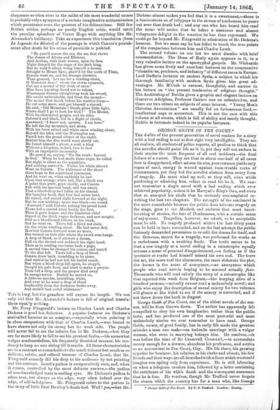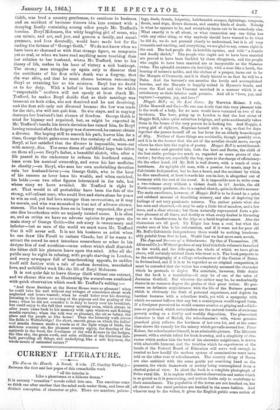GEORGE GEITH OF FEN COURT.*
THE dislike of the present generation of novel readers for a story with a bad ending is not at first sight very intelligible. They are all realists, all students of police reports, all profess to think that the novelist should paint life as it is, yet they will not endure in their stories the most frequent of all real incidents—the final failure of a career. They see that in about one-half of all cases love is disappointed, effort misses its aim, perseverance yields only ropes of sand, energy is wasted against itnmoveable rocks of circumstance, yet they bid the novelist abstain from every form of tragedy. He must wind up well, or they will, even while pardoning or admiring him, refuse to read his bo dt. We can- not remember a single novel with a bad ending which ever achieved popularity, unless it be Marryat's King's Own, and even that so annoyed his circle that he seriously contemplated re- writing the last two chapters. The strength of the sentiment is the more remarkable because the public does tolerate tragedy on the stage, goes to see Macbeth, and endures that most heart- breaking of stories, the fate of Desdemona, with a certain sense of enjoyment. Tragedies, however, we admit, to be acceptable must be old. No tragedy produced within the last thirty years can be held to have succeeded, and on the last attempt the public furiously demanded permission to re-edit the drama for itself, and the Octoroon, meant for a tragedy, was performed for weeks as a melodrama with a soothing finale. The truth seems to be that a new tragedy or a novel ending in a catastrophe equally arouses a sense of personal disappointrnent,—a feeling as if the spectator or reader had himself missed his own end. The truer the art, the more real the characters, the more elaborate the plot, the keener is the sense of annoyance,—an annoyance which people who read novels hoping to be amused actually fear. Thousands who will read calmly the story of a catastrophe like that reported this week from Belgium,—the burying alive of a hundred persons,—actually cannot read a melancholy novel ; and girls who enjoy the description of unreal misery for two volumes will glance at the third to see if the misery, is corrected, and if not throw down the'book in disgust.
George Gel/it of Pen Court, one of the ablest novels of the sea- son, will be thus thrown down. The author has apparently felt compelled to obey his own imagination rather than the public, taste, and has produced one of the most 'powerful and most melancholy stories we ever remember to have read. George Geith, curate, of good family, has in early life made the greatest mistake a man can make—an imbecile marriage with a vulgar woman, who even in marrying betrays him. He resolves, —it was before the time of Sir Cresswell Cresswell,—to accumulate money enough for a divorce, abandons his profession, and settles as an accountant in Fen Court, City. His life there, his growing appetite for business, his relation,to his clerks and clients, his few friends and their ways are all described with a force which we should imagine can spring only from experience. He is still labouring on when a telegram reaches him, followed by a letter containing the certificate of his wife's death and the consequent assurance that he is free. He resolves, though Mr. Trafford never forgets the charm which the country has for a man who, like George • George Geith of Pee Court. By F. G. Trafford. Landon: Tinsley. Geith, was bred a country gentleman-, to continue in business, and an accident of business throws him into contact with a
decaying family containing among other people Mr. Trafford's heroine. Beryl Molozane, the witty laughing girl of sense, who can mimic, and act, and jeer, and govern a family, and smash
pretence, and love devotedly, would have made but for the ending the fortune of " George Geith." We do not know when we have been so charmed as with that strange figure, so composite yet so real, or when we have read anything more touching than her relation to her husband, whom Mr. Trafford, true to his theory of life, makes in his hour of victory a sick bankrupt. The strong man struggles up again only to discover that the certificate of his first wife's death was a forgery, that
she was alive, and that he must choose between renouncing Beryl or retaining her as his mistress. Beryl has no doubt as to her duty. With a belief in human nature for which
"respectable" mothers will not openly, at least thank Mr. Trafford, he makes Beryl decide that as their marriage was
innocent on both sides, she not deceived and he not deceiving, and the first wife only not divorced because the law was made for the rich, she will not quit him. So she stays, and in staying destroys her husband's last chance of freedom. George Geith is tried for bigamy and acquitted, but, as might be expected in Mr. Trafford's hands, his love's devotion has ruined him, for Beryl having remained after the forgery was discovered, be cannot obtain a divorce. She hoping still to smooth his path, leaves him for a time, George Geith gains once more the certainty of wealth, and Beryl, at last satisfied that the divorce is impossible, worn-out with misery, dies. The same doom of unfulfilled hope has fallen on them all ;—on Beryl's father, a beautiful sketch, who, after a life passed in the endeavour to redeem his burdened estate, loses even his nominal ownership, and owes his last medicine to charity ;—on Beryl, who sees her own unshrinking devotion ruin her husband-lover;—on George Geith, who in the hour of his success as lover loses his wealth, and- when enriched, his bride ;—on two other figures intermixed in the tale, but whose story we have avoided. Mr Trafford is right in art. That would in all probability have been the fate of the strong, self-reliant man, who could live and slave alone for years to win an end, yet feel love stronger than conventions, or it may
be morals, and who. was enmeshed in that net of adverse circum- stances. The bad woman lives on in luxury respected, the good
one dies heartbroken with an unjustly tainted name. It is often
so, and as critics we have no adverse opinion to pass upon the main story of George Geith—the sub-story is unnecessary and
inferior—but as men of the world we must warn Mr. Trafford that it will never sell. It is not his business as artist when he can draw like Fuseli to imitate Claude, but if be wants to attract the crowd he must introduce somewhere or other in his designs bits of real sunshine—some colour which shall diminish the bitter chill his piotures leave upon the mind. After all the public may be right in refusing, with people starving in London, and every newspaper full of heartbreaking appeals, to sadden itself still further with a tale of useless devotion, unsatisfied love, and unfulfilled work like the life of Beryl Molozane.
It is not quite fair to leave George Geith without one extract, and we choose this one as illustrating the naturalness combined vvith quick observation which mark Mr. Trafford's writing :—
"And those Sundays at the Dower House were so pleasant! when he could take his rest without any twinges of conscience about work neglected and hours wasted; when he could loiter over his dressing, listening to the insane co-cooing of the pigeons and the prating of the hens; when he did not consider it is duty to hurry over his breakfast,
but could enjoy to the full that sunny morning room, which always in after years came back to his memory with open windows and floating
muslin curtains; when the talk was so pleasant, the air so balmy, the place and the people so like home ! Then the leisurely walk across . the fields to Wattisbridge! the short, smooth grass on which the ladies' cool muslin dresses made a rustle as of the light wings of birds, the delicious country air, the pleasant country sights, the dancing of the squirrels in the wood, the loveliness of the wild flowers in the hedges, the blue sky, the green earth, and calm stillness of the Christian Sab- bath pervading all things, and underlying, like a soft key-note, the whole mush; of animated nature !"































 Previous page
Previous page